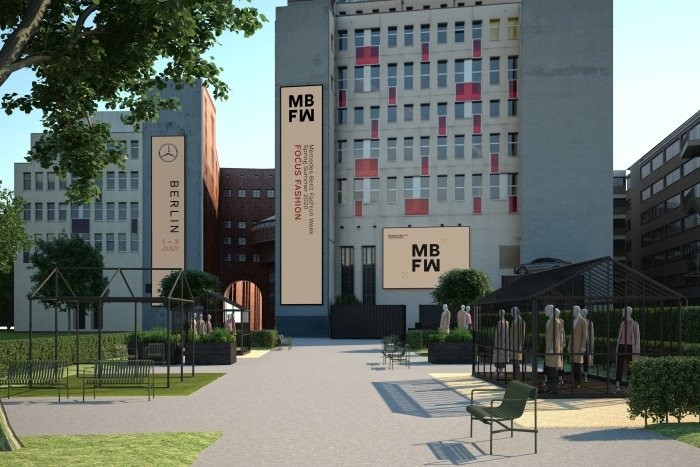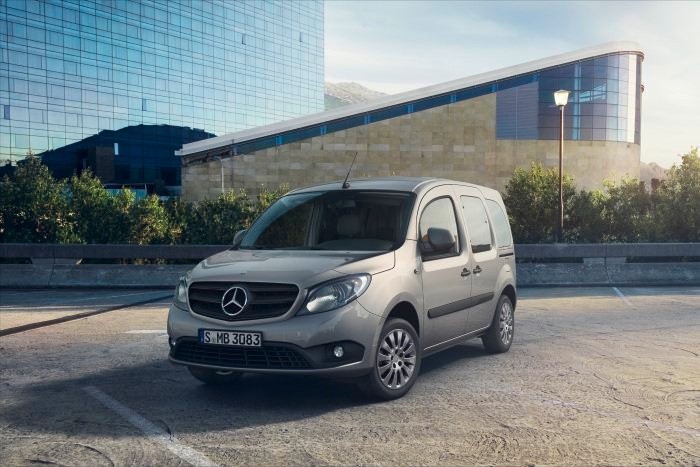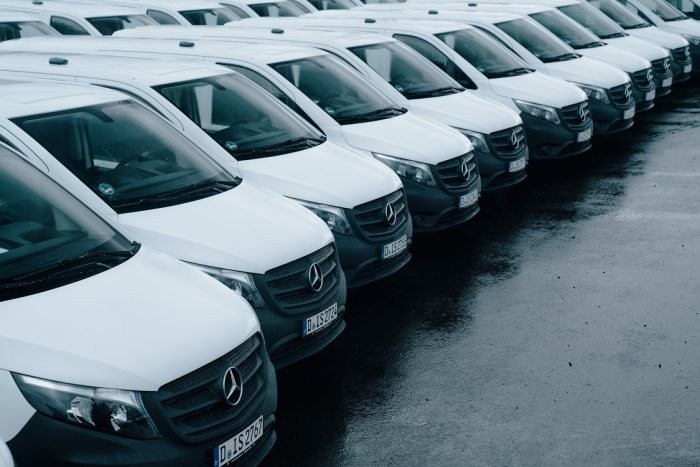combined power consumption: 20.8 – 19.7 kWh/100 km; combined CO2 emissions: 0 g/km* Daimler for the second time one of the main partners of the Tech Open Air (TOA) Festival in Berlin Joint show stand with T-Systems illustrates digital future using the example of the urban space Focus on gaming and eMobility Latest information at… Continue reading Mobility and networking in the city of tomorrow: Daimler at the Tech Open Air in Berlin
Author: Daimler Official News
MBFW Berlin 2019
27.
June 2019
Stuttgart/Berlin
Stuttgart/Berlin. As of July 1, the eyes of the fashion world will be on the metropolis on the river Spree. You too can experience the opening of this year's MBFW Berlin exclusively via the Mercedes me media communication platform: https://media.mercedes-benz.com/mbfwberlin2019. Look forward to live impressions from the runway at MBFW, which is taking place on the forecourt of the ewerk in Berlin Mitte.
On July 1, 2019 at 12 noon (CEST) the opening show by Christoph Rumpf will be broadcast live on Mercedes me media for the first time: https://media.mercedes-benz.com/mbfwberlin2019. The recording will be available as video on demand afterwards. You can also find the press release, press photos, and interesting background details on the activities of the brand with the star at MBFW Berlin 2019 on Mercedes me media: https://media.mercedes-benz.com
On July 1, the Austrian designer Christoph Rumpf will open MBFW Spring/Summer 2020 in Berlin to an audience of fashion experts, buyers and journalists as part of the Mercedes-Benz Fashion Talents Programme for promoting young international fashion designers. Until Wednesday evening, July 3, 15 further labels will be presenting their collections at the ewerk in central Berlin.
Christoph Rumpf at MBFW
The 25-year-old student at the University of Applied Arts in Vienna won the Grand Prix du Jury Première Vision a few weeks ago at the 34th International Festival of Fashion, Photography and Fashion Accessories in Hyères.
The award includes the invitation to Berlin as part of the Mercedes-Benz Fashion Talents Programme.
Press Contact
Mona Moll
Lab1886 & Mercedes-Benz Fashion Engagement Global
mona.moll@daimler.com
Tel: +49 711 17 93799
Fax: +49 711 17-91437
Press Contact Overview
Media
Download
Pictures (1)
Documents (1)
Media Contact (1)
Filter
Show thumbnails
Show list
Slideshow
Zoom
Preview
Details
Do you really want to delete the data record?
Please wait a moment …
Please wait a moment …
Please wait a moment …
Please wait a moment …
19A0533
Loading
New generation of the GLC and GLC Coupé: Starting signal
Bremen. Production of the new generation of the GLC and the GLC Coupé has started at the Mercedes-Benz plant in Bremen. The most popular SUV model of the Mercedes-Benz brand is built flexible on one line together with the C-Class Saloon, the C-Class Estate and the all-electric EQC (combined power consumption: 20.8 – 19.7 kWh/100… Continue reading New generation of the GLC and GLC Coupé: Starting signal
From Hungary to the world: Start of production of the new CLA Shooting Brake at the Mercedes-Benz plant in Kecskemét
Mercedes-Benz Cars is continuing its ramp-up cascade for the new compact cars at short intervals, thereby demonstrating the potential of its flexible and efficient production. The new CLA Shooting Brake is produced exclusively by the Mercedes-Benz plant in Hungary – like the preceding model and the CLA Coupé. Innovative logistical concepts, such as the delivery… Continue reading From Hungary to the world: Start of production of the new CLA Shooting Brake at the Mercedes-Benz plant in Kecskemét
Mercedes-Benz Vans: Sales start for the Mercedes-Benz Citan Night Package
25.
June 2019
Stuttgart
The Mercedes-Benz Citan Tourer and Panel Van models recently became available for order with a new equipment package: the Night Package with strikingly sporty accents and elegant black design elements give the compact small van from Mercedes-Benz Vans a bold look.
The Night Package features black painted exterior mirrors, a radiator grille in black chrome, a tailgate with black trim strip and 16-inch light-alloy wheels in matt grey. What's more, the Panel Van also features tinted glazing for the rear window. The Tourer equipped with the Night Package also features a tinted rear window as well as dark-tinted rear side windows which protect passengers from the effects of heat and direct sunlight. The Night Package is priced at 1535.10 euros (including 19 percent VAT) and is available in all markets in which the Citan is sold. Deliveries will start in September 2019.
Besides the Night Package, the equally newly available Design Package RED also serves to enhance the Citan's dynamic appearance. Red decor stripes under the radiator grille at the front and on the mirror housings, as well as grey stripes in the lower area of the driver's and co-driver's doors as well as the sliding doors serve to highlight the unique character of the vehicle. What's more, the package scores extra points thanks to its chrome-plated radiator trim and chrome trim strip on the tailgate.
Press Contact
Peter Feneberg
Spokesperson Product Communications Vans – Citan, Vito and Connectivity
peter.feneberg@daimler.com
Tel: +49 (0)711 17-47117
Fax: +49 (0)711 17-52030
Press Contact Overview
Media
Download
Pictures (1)
Documents (1)
Media Contact (1)
Filter
Show thumbnails
Show list
Slideshow
Zoom
Preview
Details
Do you really want to delete the data record?
Please wait a moment …
Please wait a moment …
Please wait a moment …
Please wait a moment …
19A0523
Loading
https://media.daimler.com/marsMediaSite/en/instance/ko.xhtml?oid=43697938
24.
June 2019
Bad Hersfeld
Bad Hersfeld – Die ISS Communication Services GmbH hat insgesamt 225 Mercedes-Benz Vito übernommen, die künftig bundesweit für Wartungsarbeiten im Mobilfunkbereich eingesetzt werden. Die Übergabe fand im nordhessischen Bad Hersfeld statt – von hier erfolgt die räumliche Verteilung der Transporter in die jeweiligen Einsatzgebiete.
Bei den Fahrzeugen handelt es sich um weiße Vito Kastenwagen in der kompakten und Langversion mit Allradantrieb, der für den geplanten Einsatz auch abseits von Straßen notwendig ist. Die Fahrzeuge sind für den längeren Aufenthalt im Freien teilweise mit Standheizung ausgestattet und haben alle einen SR5 Regalinnenausbau der Firma Sortimo erhalten. Aktiver Park-Assistent sowie die serienmäßigen ATTENTION ASSIST, Seitenwind-Assistent und TEMPOMAT sorgen für komfortables und noch sicheres Fahren.
Seit der Markteinführung 1996 ist der Mercedes-Benz Vito der Inbegriff für einen vielseitigen mittelgroßen Transporter. Von der aktuell dritten Generation wurden seit dessen Einführung im Herbst 2014 weltweit knapp 450.000 Einheiten verkauft. Im Handwerk und Handel, als Service-Mobil, Lieferfahrzeug oder bei der Personenbeförderung: Vielseitigkeit, Flexibilität und ein ausgewogenes Preis-Leistungs-Verhältnis machen den Mercedes-Benz Vito so erfolgreich.
ISS Communication Services ist ein Tochterunternehmen der ISS Facility Services Holding GmbH und für Unternehmen aus der Telekommunikationsbranche als Partner für Facility Services tätig. ISS Deutschland ist Teil von ISS A/S – einer der international führenden Serviceorganisationen mit Hauptsitz in Kopenhagen, das 2018 einen Jahresumsatz von 9,87 Milliarden Euro verzeichnete und über 480.000 Mitarbeiterinnen und Mitarbeiter hat.
Press Contact
Andreas Leo
Spokesperson Mercedes-Benz Vans Sales Germany
andreas.leo@daimler.com
Tel: +49 (0)30 26943017
Fax: +49 (0)711 17-52030
Press Contact Overview
Media
Download
Pictures (3)
Media Contact (1)
Filter
Show thumbnails
Show list
Slideshow
Zoom
Preview
Details
Do you really want to delete the data record?
Please wait a moment …
Please wait a moment …
Please wait a moment …
Please wait a moment …
19C0521_02
19C0521_01
19C0521_03
Loading
Mercedes-Benz Cars signs a Memorandum of Understanding for new car assembly in Egypt
Mercedes-Benz Cars is planning to assemble passenger cars in Egypt in cooperation with a local partner. Following successful discussions, the company signed a Memorandum of Understanding with the Egyptian government on Monday. Markus Schäfer, member of the Daimler AG Board of Management for Group Research and Mercedes-Benz Cars Development: “Egypt has been an important market… Continue reading Mercedes-Benz Cars signs a Memorandum of Understanding for new car assembly in Egypt
Daimler adjusts earnings expectations
Increase of provisions for various ongoing governmental proceedings and measures relating to Diesel vehicles by a high three digit million amount will affect Daimler’s second quarter 2019 earnings and be taken into account in the Group EBIT. Outlook for Group EBIT in 2019 now expected to be in the magnitude of the previous year. Return… Continue reading Daimler adjusts earnings expectations
23. Jul 2019Daimler welcomes investment by BAIC Group
July 23, 2019 – Daimler welcomes investment by BAIC Group Ola Källenius, Chairman of the Board of Management of Daimler AG and Head of Mercedes-Benz Cars: “We are very pleased that our long-standing partner BAIC is now a long-term investor in Daimler.” Daimler and BAIC are linked in a long-term partnership Daimler has been shareholder… Continue reading 23. Jul 2019Daimler welcomes investment by BAIC Group
03. Jun 2019 Mercedes-Benz USA reports May Sales of 27,080 Vehicles
June 03, 2019 – Mercedes-Benz USA reports May Sales of 27,080 Vehicles Atlanta – Mercedes-Benz USA (MBUSA) today reported May sales of 27,080 Mercedes-Benz models – an increase of 0.4% over May 2018. Mercedes-Benz Vans reported May sales of 2,862 units and smart reported 106, bringing MBUSA to a grand total of 30,048 vehicles for… Continue reading 03. Jun 2019
Mercedes-Benz USA reports May Sales of 27,080 Vehicles


